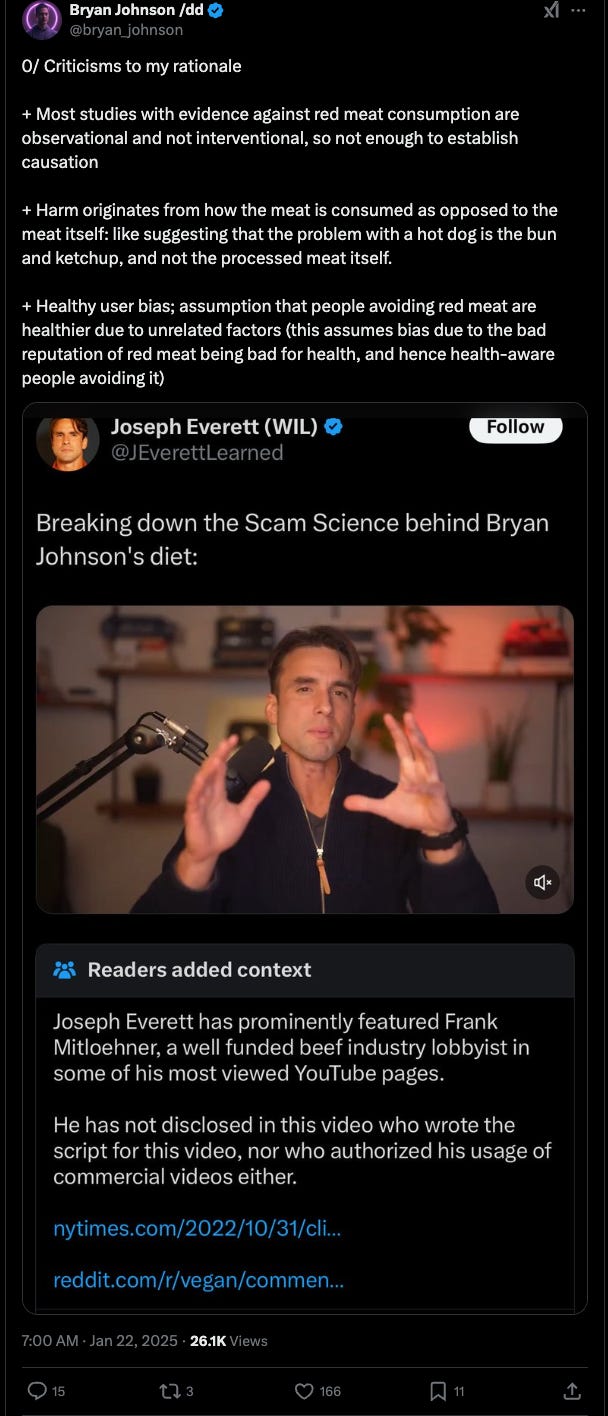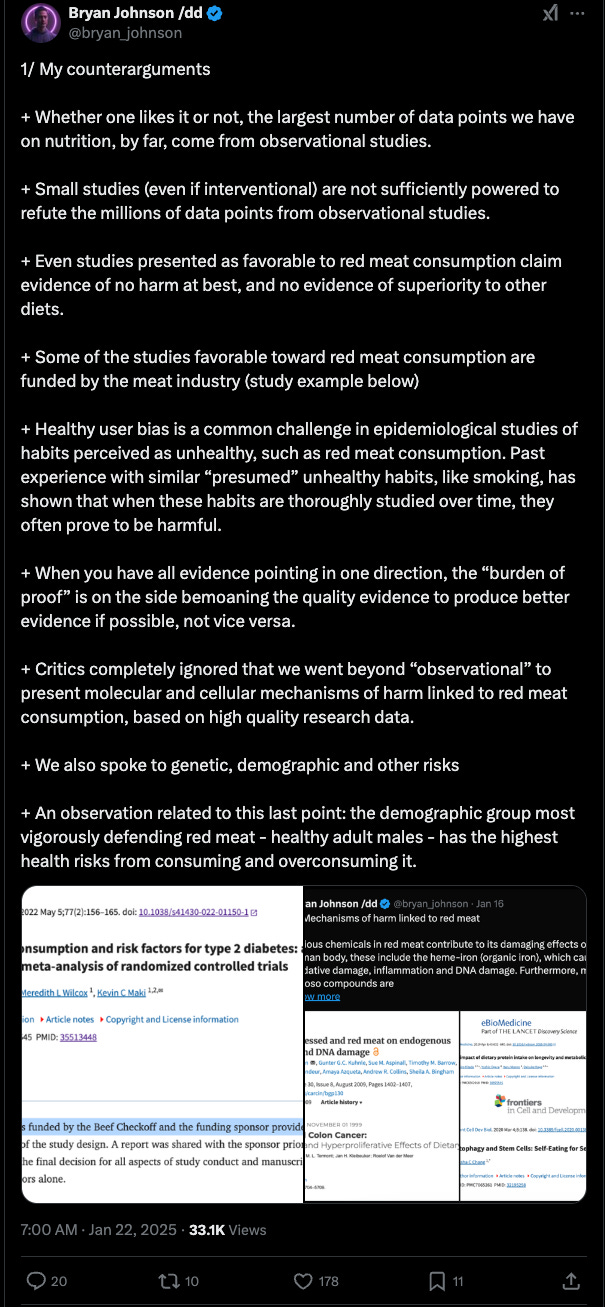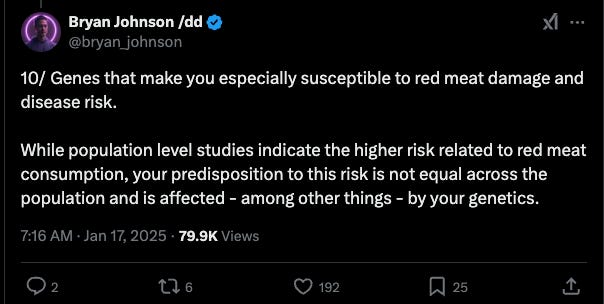WIL Weekly #65
Seed oils and the eyes, pregnant vegetarians, the man trying to live forever...
This is my free weekly newsletter covering 3 interesting points from the week. Subscribe (if you haven’t already) if you’d like to get it in your inbox each week!
Vegetable oils linked to blindness, claims Australian ophthalmologist
In a 2004 article out of the Sydney Morning Herald, ophthalmic surgeon and founder of the Macular Degeneration Foundation shares his view that the increased incidence of macular degeneration in recent times is due to the increase of vegetable oils and margarine in the food supply.
"Because the pathogenesis of the disease involves lipid membrane not being able to be digested you'd have to think there's some change in the lipid content of our diet," Beaumont says.
"One of the big changes is to put a lot of vegetable oil in the foods and to make them less biodegradable. In 1957, [in the US] margarine outsold butter - what a major change that is in the food chain.
"Vegetable oils are basically the reason why this disease has become more common. All the data is consistent with it," Beaumont says.
Dr Kerryn Phelps, former president of the AMA, concurs: "The epidemiological case against vegetable oils appears to be very strong."
The most recent study, reported in the Archives of Ophthalmology, December 2003, was conducted by Dr Johanna Seddon of Massachusetts. The prospective study, with a mean five-year follow-up, showed MD progressed 3.8 times faster in people who had a higher intake of vegetable fat.
Beaumont recommends cutting out processed oils, vegetable oils and margarine from the diet completely to prevent macular degeneration. He recommends butter and olive oil instead and that avocado, flaxseed and macadamia nut oils have not yet been studied in relation to macular degeneration.
Pregnant women should not be doing vegetarian diets
A study from just this year titled Strict vegetarian diet and pregnancy outcomes: A systematic review and meta-analysis concluded that:
Strict vegetarian diets during pregnancy are associated with an increased risk of small-for-gestational-age infants and lower birth weights. To mitigate these risks, specific dietary guidelines emphasizing adequate intake of critical nutrients such as vitamin B12, iron, omega-3 fatty acids, and iodine should be developed.
Update on the Crap Science behind Bryan Johnson’s $2M Diet
I recently put out an article titled The Crap Science behind Bryan Johnson's $2M Diet and made a video about this topic, which I posted on Twitter. Long story short, Bryan Johnson made a very long twitter post on “why red meat did not make the cut to be in [his] diet” along with several studies. My main criticism was that 10 of the studies that Bryan presented were all based on questionnaire-based studies. Here is a video where I explain the blatant problems with questionnaire-based studies, but if you need an even quicker TL;DR, check out this tweet.
Bryan at first replied to me without actually addressing my criticisms.
Then, two days later, he posted this:
Personally, it seemed disingenuous to take an old screenshot of my tweet with a community note that was removed because of bogus claims - the community note that was removed well before Bryan posted this screenshot. (For the record, Mitloehner is a respected professor at UC Davis, not a "lobbyist." reddit /r/vegan is not a source.)
In any case, here are his counter points:
For the first two bullets, he is basically doubling down and trying to say that these observational, questionnaire based studies are good because there’s so many of them. Quantity over quality. He seems to acknowledge that there are small studies (which he didn’t cite) in favor of red meat, but he claims they’re not sufficient to compete with the large “number of data points” we have from questionnaire-based studies.
This is a shockingly weak defense. It’s quite similar to Joel Kahn’s defense of observational studies in the Joe Rogan vegan vs. omnivore debate I referenced. When confronted with the problems of observational studies, Joel Kahn says the “data may be crappy, but it’s still data and allows you to go further with [more and more people].” That is, the data is crappy but there’s just so much of it.
This is like saying you’ve got 20 witnesses with very very bad eyesight and they all saw a crime take place before they put their eyeglasses on. Someone with fantastic eyesight also saw the crime. Would you want to trust the testimony of the 20 people with terrible eyesight or the one person who could actually see the events clearly?
Moving on to Bryan’s other points…
+Even studies presented as favorable to red meat consumption claim evidence of no harm at best, and no evidence of superiority to other diets.
…yet he cites no studies.
+Some of the studies favorable toward red meat consumption are funded by the meat industry (study example below)
He links one study that was favorable to meat that was funded by the Beef Checkoff program. Who cares? There are all kinds of studies funded by pro-plant companies. Pro-avocado studies funded by the Hass Avocado Board, pro-oatmeal studies funded by Quaker Oats, studies funded by the National Honey Board, studies about pomegranate juice funded by POM Wonderful and so on and so on. Because industry-funded studies for plant-based products exist doesn’t mean that a plant-based diet is bad for you.
+Healthy user bias is a common challenge in epidemiological studies of habits perceived as unhealthy, such as red meat consumption. Past experience with similar “presumed” unhealthy habits, like smoking, has shown that when these habits are thoroughly studied over time, they often prove to be harmful.
I honestly don’t understand what he is trying to say here unless he’s agreeing with me. Indeed, the healthy user bias is an issue that is very difficult cleanse epidemiological studies of. Let’s say you want to see if dates are good or bad for people but you’ve been telling the whole planet that dates are terrible for you. The type of people who try to be healthy are going to do all kinds of stuff as well as avoid dates. The type of people who don’t care about being healthy are going to live an unhealthy lifestyle and recklessly eat dates. What does this have to do with us finding out that cigarettes are bad for people? Please help me out in the comments if I’m missing Bryan’s point.
+When you have all evidence pointing in one direction…
This is a very grandiose and naive statement. To say “all the evidence” points in favor of meat being bad for you is simply untrue. It’s almost as ludicrous as claiming yourself to be “the healthiest person on the planet.” On that note, I actually recently took the title for the healthiest person on the planet.
Moving on, Bryan also said:
+Critics completely ignored that we went beyond "observational" to present molecular and cellular mechanisms of harm linked to red meat consumption...
I’ve actually covered the topic of red & processed meat, nitrosation and colon cancer in a video from 2019. You can check it out here.
+We also spoke to genetic, demographic and other risks…
I think he’s referring to this portion of his original tweet thread?
…He didn’t link any studies.
P.S. - Fasting 🍽️
I’ve put together something for those of you wanting to learn my optimized Fasting protocol. Check it out here: https://bit.ly/FastToLast










Keep at it dog, fight the good fight.
I can never understand why it's so hard for people to understand that a lot of bad data is still bad data. Epidemiology CAN be helpful for certain things, but it's not the nitty gritty science we need more of when trying to determine what people should eat. Thankfully we seem to have been getting better trials & studies looking at metabolic health in recent years. I saw on a recent podcast somewhere (cannot remember where, but it was probably The Metabolic Link), but Dr. Dom D'Agostino showed a graph of the # of published studies on ketogenic diets in the past decade, & it has continued accelerating over the years.
Side note, I lol'd at twitter notes saying Frank Mitloehner was a lobbyist.